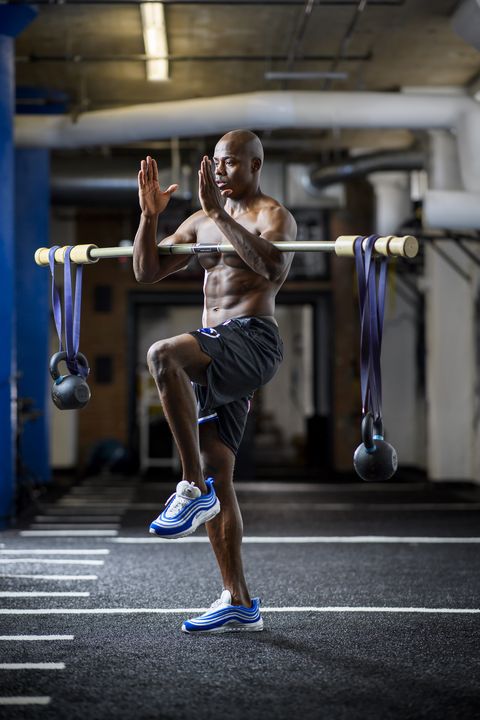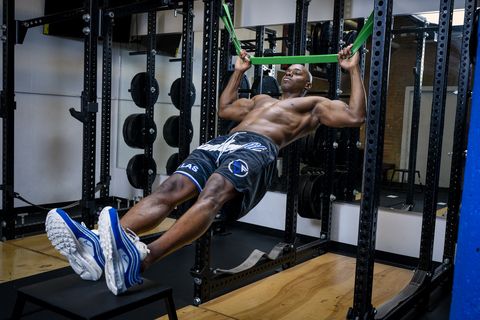Training your major muscle groups regularly is hard enough. The last thing you have time to do is train the little guys—your rotator cuffs, your hip stabilizers, and your external obliques—that support your main core muscles. But what if you could target these neglected muscle groups while still blasting major ones like your chest, back, and legs, too?
Finish off your next workout with some “chaos band training”and you can pull that off. And sure, this emerging trend looks like a #gymfail waiting to happen. But it’s a chance to force every muscle in your body to work as one as you battle an unstable, unpredictable resistance band.
Chaos band training works by integrating classic resistance bands into basic moves—except the bands aren’t providing resistance. In some moves (such as the chinup on the preceding page), the band replaces a bar, shifting back and forth as you try to do each rep. In others (like the squat on the next page), weights hang from the band, and their constant shaking pushes you to lock in every core muscle you have. Both approaches build strength, help safeguard your joints, and, yes, look badass on Instagram.

The training style isn’t new. Decades ago, Westside Barbell, an Ohio-based strength-training gym, began using something called a “bamboo bar,” an ultra-bendy barbell that wobbled when loaded with weight, challenging the stabilizing muscles of powerlifters doing classic exercises. Not every gym has a bamboo bar, of course, so savvy trainers started hanging weights from resistance bands to create similar instability. Now elite athletes embrace chaos training, too, in part because it duplicates the unpredictability they experience on the field. Texas-based trainer Melvin Sanders, C.S.C.S., uses it with the Dallas Cowboys’ Dak Prescott and Ezekiel Elliott. And when the Tennessee Titans’ bulldozer running back Derrick Henry, another Sanders client, did a chaos band pushup with his feet on a stability ball in April, the video landed on SportsCenter. “The core work you get from that band is unreal,” Sanders says. “It works the hell out of your stabilization muscles.”
You’re supposed to control your core and activate your stabilizer muscles
in every exercise. But you’re often too focused on lifting heavy weights to pay attention to squeezing your abs, glutes, and shoulder blades. That’s not the case with chaos band training, and every time Sanders sets somebody up to do a chaos band plank, he watches them tighten their muscles extra hard. “They’re like,‘Oh, shit!’ ” he says. “You really have to be locked in and control your core.”
Master that control, and when you do classic pushups, you’ll dominate. And it only takes a little bit of chaos, says MH advisor Dan Giordano, D.P.T., C.S.C.S., to hone strength in those stabilizers while prepping your body for heavier weights. “Think of it as essential accessory work,” he says. “I would add this in at the end of a strength-training day, as a complement to your other training.”
Band Camp
Start with these four chaos band training exercises, which challenge your whole body.
1. Chaos Pushup

Stretch a heavily weighted band around the hooks of a squat rack, at about thigh level. Place your hands on the band and extend your legs behind you on a box (or for more challenge, a stability ball). Bend at the arms and shoulders, lowering your chest to the band; press back up. Do 3 sets of 10.
2. Zercher March

Set up a barbell in a squat rack, at about elbow level. Wrap a band around each side of the barbell; hang a light weight from each band. Pick up the bar in the creases of your elbows, abs tight. March in place for 30 seconds. Do 3 sets.
3. Bodyweight Row

Stretch a heavily weighted band around the hooks or bars of a squat rack, at about thigh level. Lie with your back on the floor beneath the band, shoulders directly under it. Reach up and grasp the band, using an overhand grip. Tighten your abs and glutes. Keeping a straight line from shoulders through feet, pull your chest toward the band.Pause, then lower. That’s 1 rep; do 3 sets of 6 to 8.
4. Kettlebell Front Squat

Wrap the handle of a kettlebell on the floor in a heavily weighted band. Squat down and grasp the ends of the band near the handle; keep your hands close to your shoulders. Stand with the weight, keeping your hands (and the ends of the band) near your shoulders. Push your butt back and lower into a squat; stand back up. That’s 1 rep; do 3 sets of 8 to 10.
Commandments of Chaos
Follow these rules to safely implement chaos band training in your routine.
DO: The Double Bands
Always use the thickest looped bands available in your gym. “Don’t be afraid to use multiple bands, either,” says MH fitness director Ebenezer Samuel, C.S.C.S. Even with ultra heavy bands, weights will oscillate up and down, allowing your muscles to work.
DON’T: Overuse the Chaos
“Use it sparingly,” says David Otey, C.S.C.S. Aim to start your routine with classic exercises. Choose one chaos band move a day, at most, and do it as your last exercise.
DO: Use Light Weights
You won’t max out with chaosband exercises. Start with 50 percent less weight than normal on weighted moves.
DON’T: Get Ballistic
Don’t expect to do clapping pushups or explosive squats with chaos bands. Do all your reps under control.
A version of this story originally appears in the October 2021 issue of Men’s Health, with the title “EMBRACE CHAOS, FORGE MUSCLE”.
Source: Read Full Article
